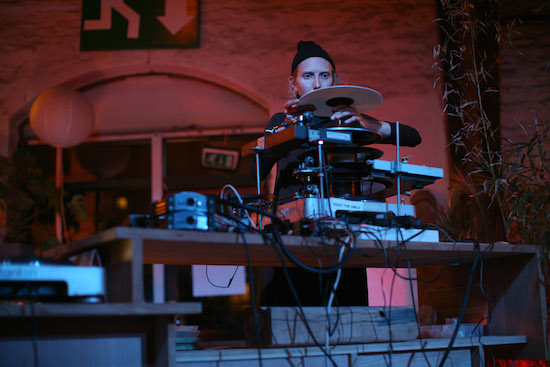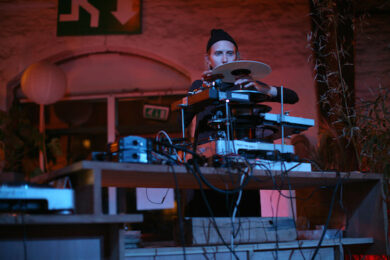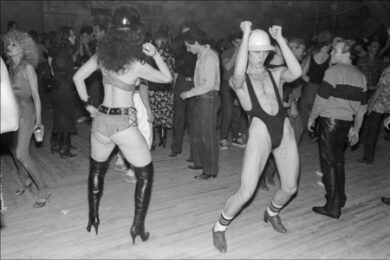Amazingly, the term "experimental music" has been struggling to find a definition since about 1955 when John Cage began wrestling with the idea (later quoted in Michael Nyman’s book, Experimental Music). Cage’s tentative explanation was, "not […] an act to be later judged in terms of success or failure, but simply […] an act the outcome of which is unknown." The legion of artists who now have "experimental" on their press releases might not adhere to this; it’s rare to see a musician take the risk of making something "unknown." Perhaps "experimental music" now means "John Cage Flavour" as opposed to "Boulez Flavour"; North American social libertarianism versus Western European academic traditionalism?
Last month, the delightful and enterprising SPOR festival in the charming, if rain-splattered Danish city of Aarhus (the council have sheepishly dropped the marketing phrase "City Of Smiles") presented a line-up that featured a high quota of music that had a genuine sense of the experimental: processes testing out a hypothesis, musical material taken down paths that might equally lead to success or failure, without those being important criteria. Like the best of any work in the laboratory, it was both enlightening and entertaining.
"Do It Anyway" was the instruction serving as titular theme for this year’s festival, guest-curated by the creative whirlwind that is Irish composer Jennifer Walshe. More than the vast majority working in "new music" today, Walshe really embodies that spirit of "doing it", with her bewildering back catalogue of music created under the multiple personalities of the fictional Grúpat collective, her vocal improvisations and the internet-age sprawl of her imagination, which finds room for music about gaming, voguing, skateboarding, and an eerie, scary opera featuring pound shop Barbies.
Walshe’s biggest contribution to SPOR 2014 has been to import some North American music rarely heard in Europe, such as the late Harris Wulfson’s LiveScore (2006), for musicians playing not from sheet music, but digital scores that evolve in real time. Positioned in front of the live ensemble, a MIDI mixing desk is labelled "Please turn the knobs to change the music" and, sure enough, the audience’s fiddling at the controls causes the dynamic and density of the notes to shift. As the audience becomes bolder about controlling the players, the music meanders into more interesting areas, although it is really the process, rather than the sound, that fascinates everyone.
James Saunder’s You Say What To Do (2014) explores a similar conceit, in more exuberant and ramshackle form. Two musicians are armed with an array of musical (and not-so-musical) sound sources: alarm clock, party horns, Stylophone, whoopee cushion, mini Korg monosynths, toy percussion instruments, etc. These are bashed and blown and triggered according to a matrix of simple instructions called out by a team of "assistants" drawn from the audience immediately before the performance. Like a musical Stanford Prison Experiment, some of the assistants perform their role with considerably more dictatorial gusto than others, leading to an absurd and hilarious performance as the musicians race to fulfil the demands. "Everyone’s set up to fail," Saunders explains afterwards, "the aim is for everyone to do the best they can." Performers Serge Vuille and Mark Knoop certainly strive for that, approaching the task with wild commitment.
The Vuille/Knoop partnership also shines in Jessie Marino’s weird, fun, occasionally creepy, Heartful Bird, Vivid And Great In Style (2014), in which they re-enact physical actions taken from no-budget American public access television and David Bird’s Fields (2010), performed on top of the swooping metal roof of Aarhus’ Godsbanen arts centre (the repurposed freight train depot). The relentless sound of their snare drumming begins to ricochet off the surrounding buildings, as if the whole city has become a huge vibrating surface. It’s a beautiful experience, thrilling and dramatic.
A blurring of the lines between performance, installation, music, drama and sound art has become something of the hallmark of SPOR’s programming and several events are hard to categorise. An installation by turntablist duo Vinyl Terror and Horror, for example, has a deft performative quality. Entitled The Host, the piece consists of an animatronic theatrical set that projects its own suspenseful narrative soundtrack: a needle drops on broken vinyl, a door creaks open, footsteps move across the floor and an emphysematous speaker splutters to life, expelling an electronic lungful of smoke. It has all the silliness and top entertainment value of the best poltergeist movies.
A parallel combination of the dramatically spontaneous and the seriously sinister pervades Object Collection’s performance, New York Girls. The work is a series of cryptic theatrical tableaux, a compendium of actions ranging from the obsessive arranging and re-arranging of household objects, to spoken word obliterated by walls of noise; constant digressions from form and storytelling. The most touching episode features a solo singer repeatedly echoing and contradicting his own pre-recorded "shadow"; "I am like everyone you know… I am not like anyone you know…" Somehow the makeshift nature of the staging summons a melancholy, like a fractured memory played out in the ravaged remains of the city.
For festival whose title indicates a preference for the impulsive, improvised music appears surprisingly little. In fact, Jennifer Walshe saves it for her one appearance as performer, in her regular duo with the legendary Tony Conrad, Ma La Pert. Walshe really is a startlingly resourceful singer, barking like a dog one moment, moving into unearthly glossolalia the next, totally persuasive even when singing with a mouthful of popping candy. Conrad grounds her in the most complementary way. His violin, these days, is a blackened, battle-scarred object, trailing extra strings and preparations. When he finally alights on a searing drone, the spirit of 60s dream music flickers into life, inspiring Walshe into a passage of soaring vocal purity. Similarly, Walshe’s surrealist virtuosity inspires a looseness in him. He stamps on a canvas attached to contact mics, she stamps back in her silver glitter shoes.
Towards the end of their performance, Walshe disappears offstage and a huge chord surges into the space. The Granhøj Dans, venue for several of the SPOR evening concerts, is an old Methodist mission hall and hidden behind the curtain is a dilapidated church organ. It turns out that the almost subliminal low throb throughout the evening was the organ pedals, wedged down. The full force of the organ sound coming into focus behind Conrad’s velvet drone is otherworldly.
New technology appears across the festival in some unexpected guises, such as Regin Petersen’s Soundtrack To Self (2014), which features the composer hypnotising a colleague over Skype (displayed on the big screen) to subconsciously generate the musical ideas for a string quartet. Meanwhile, the programme generates some genuinely interesting ideas about the future creation of new music and (for once) talks and seminars seem provocative and valuable. Models borrowed from the world of software development predominate; the hackathon, data mining, information retrieval and "rapid prototyping" all get covered in greater or lesser detail. Could these ideas provide some backbone to experimental music in the next few years?
One extremely promising event is the collaboration between four young composers, Paul McGuire, Martins Baumanis, Kaj Duncan David and Jens Peter Møller, whose ingenious performance, devised in just a week, is a quiet festival highlight. They draw on the simplest of materials; amplified furniture, music barely-heard through headphones, polystyrene cups and texts recited in their four native languages (Irish, Latvian, English, Danish). It’s a fine and subtle performance, made especially beautiful by the Danish rain on the roof threatening to drown out its final moments. Meteorology: still the ultimate "outcome unknown."




